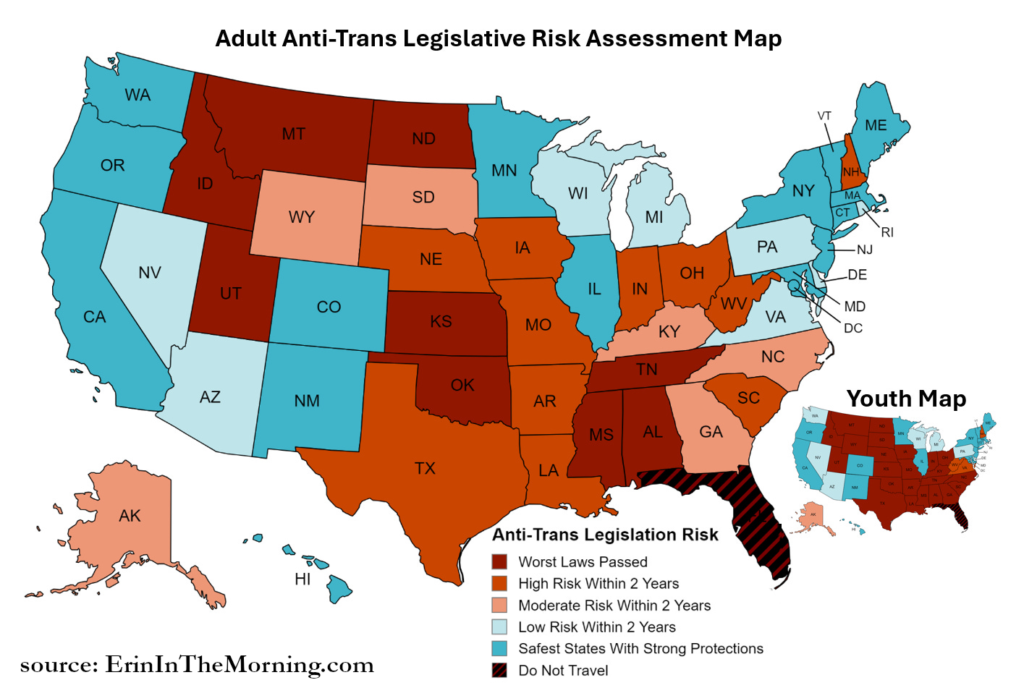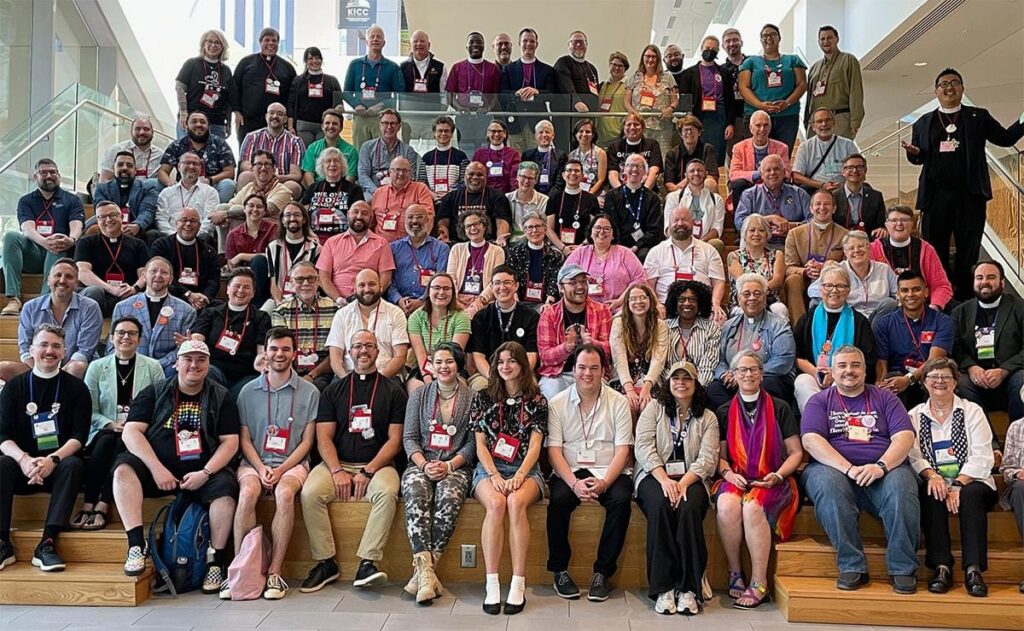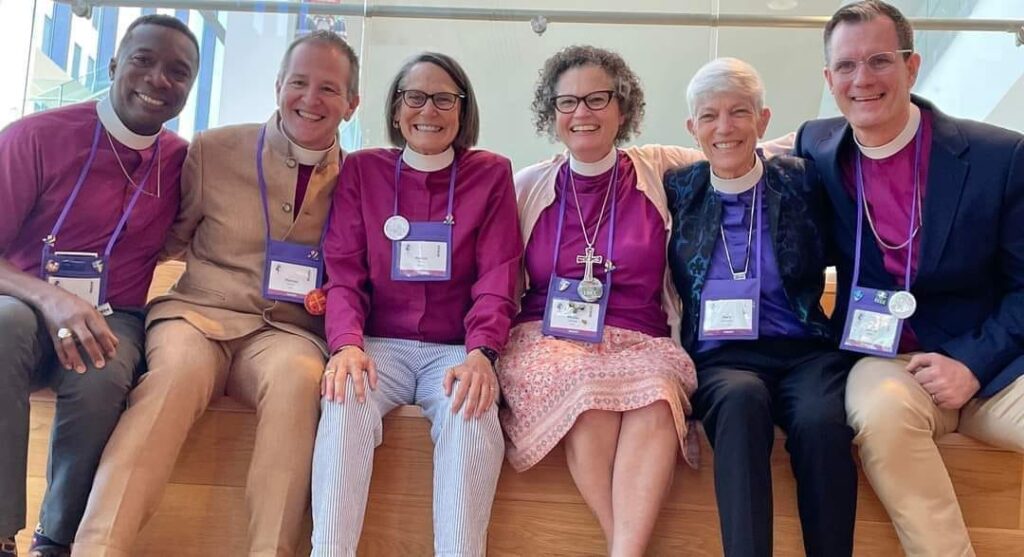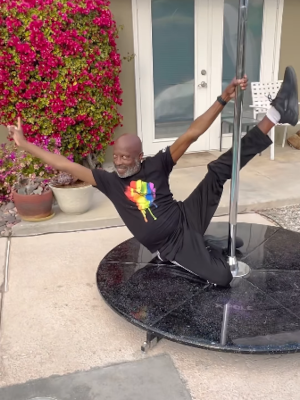by Ebby Watkins
On the evening of May 31 as the clock ticked down toward Pride Month 2024, I didn’t feel anything like the excitement I usually have. Instead I was filled with exhaustion, and honestly, dread.

This has been a tough year for LGBTQ+ people in America, especially trans people. 25 states now (half the country!) have enacted bans on gender-affirming care for minors. Libraries struggle against floods of book-banning demands; drag queen storytimes get harassed by armed protestors; schools and hospitals deemed too “woke” by online influencers receive waves of bomb threats. Pride flags hung outside churches are vandalized so frequently that a common piece of advice is “if you’re going to get a flag, go ahead and buy a 5- or 10-pack.”
My social media feed is full of LGBTQ+ people crowdfunding for basic needs, seeming to pass the same $20 back and forth to each other, in between posts from billionaires like J.K. Rowling using their platform to attack trans women (from a journalist to a soccer manager) and to deny trans people were victimized in the Holocaust.
In my personal life, my child came out as gender-expansive and I had to help them navigate the heartbreaking situation of “when you see your grandmother this weekend, do you want to tell her even though she won’t be supportive, or do you want to pretend to be a girl around her a little longer?”
Halfway through June, after two weeks of hearing background grumbling wondering if we really need Pride Month anyway, I read the obituary of veteran Col. Edward Thomas Ryan. “Edward wanted to share the following,” said the obituary, which went on to quote,
“I must tell you one more thing. I was Gay all my life: thru grade school, thru High School, thru College, thru Life….. I’m sorry for not having the courage to come out as Gay. I was afraid of being ostracized: by Family, Friends, and Co-Workers. Seeing how people like me were treated, I just could not do it. Now that my secret is known, I’ll forever Rest in Peace.”
Right now, it feels like being queer makes you radioactive: so many people who should be on your side keep their distance from you, while the other side wants to make you into a bomb that will cause as much damage as possible.
I hate it. I hate it.
Back in my previous E-vangelist article, I confessed that I’m not very good about turning to God for comfort. My prayers are angry interrogations: Why is everything like this, God? Why is everything so awful all the time? They say the arc of the universe bends towards justice but couldn’t you have made that curve bend a little more sharply while you were creating the universe? HMMM?
I’ve turned to trusted clergy to fret I might be praying “wrong” if all I bring to God are hopelessness and complaints. They were quick to reassure me that nothing is wrong. These feelings are not foreign to us as Christians, they say; just look at the Psalms.
(I was going to add a bit of levity here by quoting the scene in Monty Python and the Holy Grail where God grumbles, “It’s like those miserable Psalms, they’re so depressing!” But then I remembered the transphobic remarks John Cleese and Terry Gilliam have made in the past few years, and the movie stopped feeling so fun to quote. Ugh! Bigotry ruins everything!)
Now, the English major in me says this should be the “turning point” if I want this article to have the “correct” structure. I should now pivot from problem to solution, like in a psalm when the jangling dissonance of despair resolves into a hopeful chord.
My tears have been my food day and night…My soul is heavy within me … and then I will yet give thanks to [God], who is the help of my countenance.
My soul has longed for your salvation; I have put my hope in your word. My eyes have failed from watching for your promise is followed by My heart is joyful because of your saving help.
Why do you stand so far off, O LORD, and hide yourself in time of trouble? becomes The LORD will hear the desire of the humble…to give justice to the orphan and oppressed, so that mere mortals may strike terror no more.
If only! When, God, when will that be true?
How long shall I have perplexity in my mind, and grief in my heart, day after day? How long shall my enemy triumph over me? (You said it, Psalm 13.)
Here’s the thing: I am not a psalmist and I can’t turn this point of this article from despair to hope any better than I can do it in my own heart.
Certainly, this Pride Month has brought images that shone brightly with queer joy: LGBTQ+ attendees (including six bishops!) at General Convention.


A small-but-exuberant pride parade in Nome, Alaska. YungPoleMaster teaching TheOldGays how to pole dance. The talented, handsome, Black, queer Ncuti Gatwa starring on Doctor Who.



And I know I’ll see hundreds more moments of joy this Sunday when my family joins Shelley Byrnes and others from St. John’s and ECMN to march in the Pride Parade.
But these individual bright spots are not going to take my despair away. And from a Christian standpoint, that’s okay. We queer people have so much trauma to overcome in a society that tells us our identity is wrong; add toxic positivity and prosperity gospel on top of that and it gets hard to remember our faith isn’t wrong either. You’re not a bad Christian if you find it hard to put your trust in God, if you get annoyed by how quickly some of the Psalms go from despair to hope, if your prayers are mostly yelling.
You can be a very good and faithful Christian even when all you bring is anger, or grief, or doubt, or hopelessness. Bring it anyway; bring yourself. Come to church and worship in community—as Sister Monica Joan says in Call the Midwife (and as the Rev. Craig Lemming often quotes), “The liturgy is of comfort to the disarrayed mind. We need not choose our thoughts; the words are aligned like a rope for us to cling to.” Talk to clergy and fellow parishioners. Be open and courageous enough to answer honestly if someone at church asks “how are you?” Be open and courageous enough, also, to talk to a physician about untangling any possible clinical depression from your spiritual grief (I have both!) so if needed, each can receive distinct treatment and care.
I think often of a quote in the obituary of Steve Ashcroft, Ernie Ashcroft’s son: “A favorite line of Steve’s was by the band, Silver Jews: ’You can’t change the feeling, but you can change your feelings about the feeling.’” We can do that! We can acknowledge the despair and even though we can’t change it, we can choose not to beat ourselves up about it.
Pride Month is meant to serve as a rebuke to shame, so in this way at least, let us observe Pride by putting aside any shame about how we feel and how we pray.
(And if God ever does take my suggestions about reshaping the universe, I’ll let you know, and then we’ll really celebrate.)
